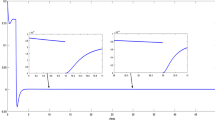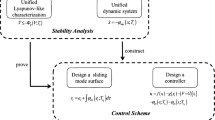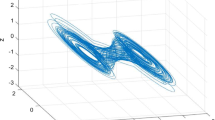Abstract
In this paper, the fixed-time synchronization of stochastic impulsive neural networks with time-varying delays is studied. For the stability problem of nonlinear systems with impulsive effects, a new fixed-time stability theorem is proposed. Compared with other fixed-time stability theorems, it has better generality. Then, in order to realize fixed-time synchronization, a state feedback controller and an adaptive controller are designed respectively. Moreover, based on the new theorem, sufficient conditions for fixed-time synchronization of stochastic impulsive neural networks with time-varying delays are given. Finally, two simulation examples are given to verify the effectiveness of the theoretical results.






Similar content being viewed by others
References
Zhang Z, Zhang Y (2012) Acceleration-level cyclic-motion generation of constrained redundant robots tracking different paths. IEEE Trans Syst Man Cybern Part B (Cybern) 42(4):1257–1269
Yang T, Chua LO (1997) Impulsive control and synchronization of nonlinear dynamical systems and application to secure communication. Int J Bifurc Chaos 7(03):645–664
Aguilar-Bustos A, Cruz-Hernández C (2009) Synchronization of discrete-time hyperchaotic systems: an application in communications. Chaos Solitons Fract 41(3):1301–1310
Zhang Y, Wang J (2002) A dual neural network for convex quadratic programming subject to linear equality and inequality constraints. Phys Lett A 298(4):271–278
Wang L, Xu D (2002) Global asymptotic stability of bidirectional associative memory neural networks with s-type distributed delays. Int J Syst Sci 33(11):869–877
Zhang R, Wang L (2009) Global exponential robust stability of interval cellular neural networks with s-type distributed delays. Math Comput Model 50(3–4):380–385
Wu S, Li KL, Huang T (2011) Exponential stability of static neural networks with time delay and impulses. IET Control Theory Appl 5(8):943–951
Wang Y, Tian Y, Li X (2021) Global exponential synchronization of interval neural networks with mixed delays via delayed impulsive control. Neurocomputing 420:290–298
Chen X, Liu Y, Jiang B, et al (2022) Exponential stability of nonlinear switched systems with hybrid delayed impulses. Int J Robust Nonlinear Control
Kamenkov GV (1953) On stability of motion over a finite interval of time. akadnauk sssrpriklmatmeh
Shen J, Cao J (2011) Finite-time synchronization of coupled neural networks via discontinuous controllers. Cogn Neurodyn 5(4):373–385
Abdurahman A, Jiang H, Teng Z (2015) Finite-time synchronization for memristor-based neural networks with time-varying delays. Neural Netw 69(3–4):20–28
Velmurugan G, Rakkiyappan R (2015) Finite-time synchronization of fractional-order memristor-based neural networks with time delays. Neural Netw 73(1–2):36–46
Polyakov A (2012) Nonlinear feedback design for fixed-time stabilization of linear control systems. IEEE Trans Autom Control 57(8):2106–2110
Zheng M, Li L, Peng H et al (2018) Fixed-time synchronization of memristor-based fuzzy cellular neural network with time-varying delay. J Frankl Inst 355(14):6780–6809
Li R, Cao J, Alsaedi A et al (2017) Exponential and fixed-time synchronization of Cohen–Grossberg neural networks with time-varying delays and reaction-diffusion terms. Appl Math Comput 313:37–51
Lü H, He W, Han QL et al (2019) Fixed-time pinning-controlled synchronization for coupled delayed neural networks with discontinuous activations. Neural Netw 116:139–149
Chen C, Li L, Peng H et al (2020) A new fixed-time stability theorem and its application to the fixed-time synchronization of neural networks. Neural Netw 123:1
Song Q, Cao J (2007) Impulsive effects on stability of fuzzy Cohen–Grossberg neural networks with time-varying delays. IEEE Trans Syst Man Cybern Part B (Cybern) 37(3):733–741
Yang X, Lu J (2015) Finite-time synchronization of coupled networks with Markovian topology and impulsive effects. IEEE Trans Autom Control 61(8):2256–2261
Li H, Li C, Huang T et al (2018) Fixed-time stabilization of impulsive Cohen–Grossberg bam neural networks. Neural Netw 98:203–211
Zhang Y, Deng S (2020) Fixed-time synchronization of complex-valued memristor-based neural networks with impulsive effects. Neural Process Lett 52(2):1263–1290
Ren H, Shi P, Deng F et al (2020) Fixed-time synchronization of delayed complex dynamical systems with stochastic perturbation via impulsive pinning control. J Frankl Inst 357(17):12308–12325
Aouiti C, Assali EA, Chérif F et al (2020) Fixed-time synchronization of competitive neural networks with proportional delays and impulsive effect. Neural Comput Appl 32(17):13245–13254
Shi F, Liu Y, Li Y et al (2022) Input-to-state stability of nonlinear systems with hybrid inputs and delayed impulses. Nonlinear Anal Hybrid Syst 44(101):145
Chen T, Wu W, Zhou W (2008) Global \(\mu \)-synchronization of linearly coupled unbounded time-varying delayed neural networks with unbounded delayed coupling. IEEE Trans Neural Networks 19(10):1809–1816
Hu C, Yu J, Jiang H (2014) Finite-time synchronization of delayed neural networks with cohen-grossberg type based on delayed feedback control. Neurocomputing 143:90–96
Wang H, Duan S, Huang T et al (2017) Synchronization of memristive delayed neural networks via hybrid impulsive control. Neurocomputing 267:615–623
Chen X, Liu Y, Ruan Q et al (2023) Stabilization of nonlinear time-delay systems: flexible delayed impulsive control. Appl Math Model 114:488–501
Zhao H, Li L, Peng H et al (2017) Finite-time topology identification and stochastic synchronization of complex network with multiple time delays. Neurocomputing 219:39–49
Zhao H, Li L, Peng H et al (2018) Finite-time robust synchronization of memrisive neural network with perturbation. Neural Process Lett 47(2):509–533
Ren H, Peng Z, Gu Y (2020) Fixed-time synchronization of stochastic memristor-based neural networks with adaptive control. Neural Netw 130:165–175
Yang X, Cao J (2010) Finite-time stochastic synchronization of complex networks. Appl Math Model 34(11):3631–3641
Hardy GH, Littlewood JE, Pólya G et al (1952) Inequalities. Cambridge University Press, Cambridge
Acknowledgements
This work is supported by the National Natural Science Foundation of China (Nos. 62103165, 62101213 and 12026211), Shandong Provincial Natural Science Foundation (No. ZR2022ZD01), Shandong Provincial Higher Educational Youth Innovation Science and Technology Program (No. 2019KJN029), and Development Program Project of Youth Innovation Team of Institutions of Higher Learning in Shandong Province.
Author information
Authors and Affiliations
Corresponding author
Additional information
Publisher's Note
Springer Nature remains neutral with regard to jurisdictional claims in published maps and institutional affiliations.
Rights and permissions
Springer Nature or its licensor (e.g. a society or other partner) holds exclusive rights to this article under a publishing agreement with the author(s) or other rightsholder(s); author self-archiving of the accepted manuscript version of this article is solely governed by the terms of such publishing agreement and applicable law.
About this article
Cite this article
Wang, Q., Zhao, H., Liu, A. et al. An Improved Fixed-Time Stability Theorem and its Application to the Synchronization of Stochastic Impulsive Neural Networks. Neural Process Lett 55, 7447–7467 (2023). https://doi.org/10.1007/s11063-023-11268-3
Accepted:
Published:
Issue Date:
DOI: https://doi.org/10.1007/s11063-023-11268-3




